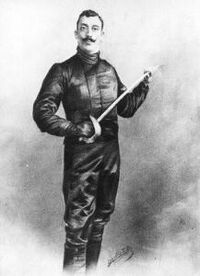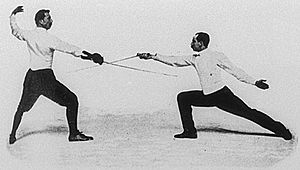Italo Santelli facts for kids
 |
||||||||||||||
| Personal information | ||||||||||||||
|---|---|---|---|---|---|---|---|---|---|---|---|---|---|---|
| Born | 15 August 1866 Carrodano (La Spezia), Italy |
|||||||||||||
| Died | February 8, 1945 (aged 78) Livorno, Italy |
|||||||||||||
|
Medal record
|
||||||||||||||
Italo Santelli (born August 15, 1866 – died February 8, 1945) was an Italian fencer. He is known as the "father of modern sabre fencing." This means he helped create the way sabre fencing is done today.
Contents
Italo Santelli's Life Story
Italo Santelli was born in Carrodano, a town in Italy, in 1866. He went to important Italian schools, including the Scuola Magistrale of Rome. He finished his studies there in 1889.
By 1896, Santelli was a well-known fencing master. He moved to Budapest, Hungary, with his brother Otello, who was also a fencer, and his wife. His son, Giorgio, was born in Hungary in 1897. Giorgio always kept his Italian citizenship.
Developing a New Fencing Style
While in Hungary, Italo Santelli started to create a new way of fencing with a sabre. This new style used much quicker defense moves than the older, traditional training. It soon became known as Santelli's "modern style" of sabre fencing.
Santelli showed off this modern style at the 1900 Summer Olympics in Paris, France. He was part of the Italian team. He placed 6th in the foil competition. However, he won a silver medal in sabre. His teammate, Antonio Conte, won the gold medal in that event.
After the Olympics, Santelli continued to teach. He coached many fencers, including George Worth. George Worth was a Hungarian-born American fencer who also won an Olympic medal.
After the Olympics
At the 1924 Summer Olympics, a Hungarian judge made a decision in a fencing match that caused some disagreement. The judge sided with France over Italy. An Italian fencer, Aldo Boni, was very upset about this decision. He spoke strongly against the judge and would not apologize.
Italo Santelli was asked to be a witness to Boni's outburst. Because of this situation, the Italian fencing team had to leave the competition.
A Family's Honor
When they returned to Italy, a journalist wrote articles that criticized Italo Santelli. The journalist suggested that Santelli had spoken against Boni. He thought Santelli wanted Boni removed from the competition because he feared Italy might beat Hungary, Santelli's adopted country. Hungary later won the bronze medal at the 1924 Games.
To defend his father's honor, Italo Santelli's son, Giorgio, challenged the journalist to a duel. This duel happened on August 28, 1924. Giorgio Santelli was a very skilled fencer at 27 years old. The journalist was about 46. Giorgio won the duel.
Eight years later, at the 1932 Games in Los Angeles, Santelli and the journalist met again. They made peace with each other.
Italo Santelli taught many famous fencing students throughout his career. He passed away on February 8, 1945, in Livorno, Italy, at the age of 78.
 | Selma Burke |
 | Pauline Powell Burns |
 | Frederick J. Brown |
 | Robert Blackburn |


